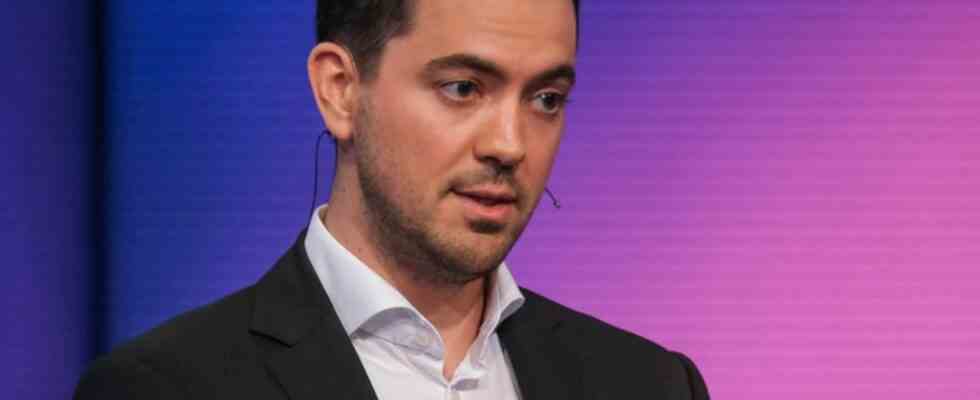Russian invasion
War in Ukraine: That’s the situation
Alexander Rodnyansky, Ukrainian Presidential Advisor, as a guest on the ARD program “Maischberger”. Photo: Oliver Ziebe/WDR/dpa
© dpa-infocom GmbH
A Ukrainian presidential adviser is confident of winning the war. However, Ukrainian troops are currently fighting an encirclement in the east of the country. The developments at a glance.
Shortly before the decision on Ukraine’s possible status as a candidate for EU membership, President Volodymyr Zelenskyj called for further sanctions against Russia.
“Russia must feel the growing pressure as a result of the war and its aggressive anti-European policy,” said the Ukrainian head of state in his video message on Wednesday night. In talks with several European heads of state and government, he stressed that a seventh package of sanctions was needed as soon as possible.
Meanwhile, fighting is continuing in eastern Ukraine, and there is a threat of encirclement by Ukrainian troops. On the other hand, the area around the city of Cherson occupied by Russian forces is gradually being recaptured, Zelensky said.
There could soon be some movement in grain exports from Ukraine – according to the Kremlin, representatives of Turkey are to travel to Moscow next week to hold talks on the blocked exports, which are leading to dangerous supply bottlenecks in developing countries in particular.
Zelenskyj adviser: “We can win the war”
Zelenskyj’s economic advisor Alexander Rodnyansky expressed his confidence in his country’s victory against the Russian aggressor. “We can win the war,” he said on the ARD program “Maischberger”. He hopes that the counteroffensive can begin in August. The support from abroad helps a lot and arrives, but it takes a while before the weapons can be used. In any case, one should not give in to the illusion of a lasting peace with Russia. Under President Vladimir Putin, the neighboring country is about imperialism – “and it will stay that way”.
Russia: Dozens of ships blocked in Ukraine
According to Russian information, 70 ships from 16 countries are currently stuck in six ports in Ukraine. According to the Russian Ministry of Defense, they cannot go to sea unhindered because of the shelling by Ukrainian forces and the high risk of mines. On the other hand, Ukraine – one of the world’s largest exporters of grain – has criticized the fact that Russia is preventing grain exports by blockading Ukrainian ports, thereby provoking a food crisis. The international community has also been demanding that Russia allow the export of Ukrainian grain for weeks.
Dead and injured in Kharkiv region
In the eastern Ukrainian region of Kharkiv, 14 adults and one child were killed by Russian attacks, Governor Oleh Synyehubov told the Telegram news service on Tuesday. 16 others were injured. According to Governor Pavel Kyrylenko, one civilian was killed in the Donetsk region and 19 others were injured. The information cannot be independently verified.
Ukrainian troops threatened with encirclement
In the heavily contested eastern Ukrainian region of Luhansk, Ukrainian units around the towns of Solote and Hirske could be surrounded by Russian forces. According to a report by the Ukrainian General Staff, the Russian troops had gained territory, so that the Ukrainian forces there could be cut off the northern road connection to their other units around Lysychansk. The connection via Wrubiwka, west of Hirske, had already come under Russian control last week.
EU Council President proposes candidate status
The decision on Ukraine’s possible status as a candidate for EU membership is now imminent. EU Council President Charles Michel advocates granting this status to both her and her small neighbor Moldova. The latest draft of the final declaration of the EU summit, which begins on Thursday, states: “The European Council has decided to grant Ukraine and the Republic of Moldova the status of a candidate country.” The 27 heads of state and government meeting in Brussels until Friday would thus follow the recommendation of the EU Commission.
That brings the day
Chancellor Olaf Scholz wants to comment on the upcoming EU, G7 and NATO summits in the Bundestag on Wednesday, which will focus on the war in Ukraine. The 20-minute government statement by the SPD politician is followed by a one-and-a-half-hour debate. In addition, the heads of the traffic light coalition are discussing possible steps against the price increases, especially for gas and energy, as a result of the war. In the afternoon, Ifo President Clemens Fuest also spoke about the consequences of the war for the economy and Germany as a business location.

